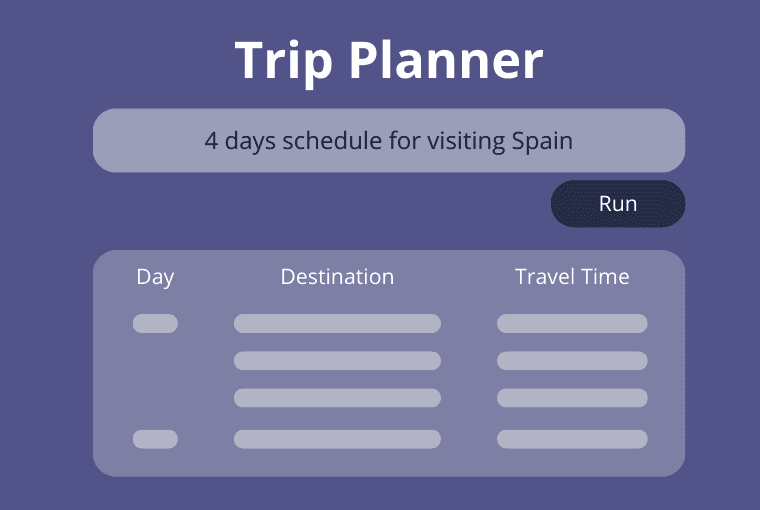In today’s digital age, AI trip planners have gained immense popularity as innovative tools that streamline and enhance the travel planning process. These intelligent systems utilize artificial intelligence technology to offer personalized itineraries, real-time recommendations, and seamless integration with travel services. In this article, we will delve into the world of AI trip planners, explore their key features, and guide you to build AI trip planner for an exceptional travel planning experience.
Understanding AI Trip Planners
Definition and purpose of AI trip planners:
AI trip planners are advanced software applications that leverage artificial intelligence algorithms to assist travelers in creating customized travel itineraries. Their primary purpose is to simplify the planning process, save time, and provide tailored recommendations based on individual preferences and interests.
How they utilize artificial intelligence technology:
AI trip planners employ sophisticated algorithms to analyze vast amounts of data, including travel destinations, accommodation options, transportation routes, and user preferences. By processing this information, they generate personalized recommendations and suggestions, mimicking the decision-making process of a human travel expert.
Key Features of AI Trip Planners
Personalized itinerary creation:
AI trip planners excel at creating personalized travel itineraries based on user preferences, such as preferred activities, sights, and trip duration. They consider factors like budget, travel style, and accessibility requirements to curate a tailored plan that matches individual needs.

Real-time recommendations and updates:
These intelligent systems continuously gather real-time data on weather conditions, local events, and attractions. They provide up-to-date recommendations and can adapt itineraries on-the-go, ensuring travelers stay informed and make the most of their journey.
Seamless integration with travel services and resources:
AI trip planners seamlessly integrate with various travel services, such as booking platforms, transportation apps, and review sites. This integration allows users to access relevant information, make reservations, and receive notifications, all within a single platform.
Build AI Trip Planner On Your Own
Gathering travel data and preferences:
To build an effective AI trip planner, start by gathering comprehensive travel data and preferences from users. This data may include travel interests, budget ranges, accommodation preferences, and desired activities. The more specific and detailed the data, the better the AI can tailor recommendations.
Selecting an AI platform or development approach:
Choose an AI platform or development approach that suits your needs. There are ready-made AI platforms available that provide pre-trained models and tools for building AI trip planners. Alternatively, you can collaborate with AI developers to create a custom solution tailored to your requirements.
Collaborating with AI developers and travel experts:
Collaboration with AI developers and travel experts is crucial to building a robust AI trip planner. Their expertise in AI technology, data analysis, and travel industry insights will ensure that your AI trip planner delivers accurate recommendations and an exceptional user experience.
Having built PlanTrips from scratch, we are open to share our experience with you. Feel free to drop us a line at [email protected] for potential collaborations.
Designing the User Experience
Intuitive interface and user-friendly navigation:
Design the AI trip planner with an intuitive interface and user-friendly navigation. The platform should be easy to navigate, with clear instructions and visual cues to guide users through the planning process effortlessly.
Incorporating customization and flexibility options:
Offer customization features that allow users to tailor their itineraries according to their preferences. Include options for adjusting trip duration, activity priorities, and filtering recommendations based on personal interests.
Ensuring accessibility for a wide range of users:
Consider accessibility features to make the AI trip planner inclusive for all users. Provide font size options, color contrast adjustments, and support for assistive technologies to ensure that individuals with varying needs can easily access and utilize the planner.
Training and Enhancing the AI Trip Planner
Continuous learning and improvement through user feedback:
Encourage users to provide feedback on their experiences with the AI trip planner. User feedback helps identify areas for improvement, allowing you to refine the system’s recommendations and enhance its performance over time.
Integration of machine learning algorithms for smarter recommendations:
Integrate machine learning algorithms into the AI trip planner to enable it to learn from user interactions and adapt its recommendations. This continuous learning process enhances the accuracy and relevance of the suggestions provided.
Updating and expanding travel data and information:
Regularly update and expand the travel data and information within the AI trip planner. This includes adding new destinations, updating attraction details, and incorporating the latest travel trends to ensure that users receive the most comprehensive and up-to-date recommendations.
Frequently Asked Questions
A. Can an AI trip planner replace human travel agents?
No, AI trip planners complement the work of human travel agents by providing automated recommendations and personalized itineraries. While AI trip planners offer convenience and efficiency, human travel agents bring a personal touch, expertise, and the ability to handle complex travel arrangements.
B. Is data privacy a concern with AI trip planners?
Data privacy is a valid concern with any technology that collects user data. Ensure that your AI trip planner adheres to strict privacy policies and data protection measures. Implement encryption, anonymization, and secure storage practices to safeguard user information.
C. Are AI trip planners cost-effective for travelers?
AI trip planners can be cost-effective for travelers, as they eliminate the need to hire professional travel planners or rely on expensive travel agencies. By leveraging AI technology, travelers can access personalized recommendations and itineraries without additional fees, making it a cost-efficient option.
Tip: At PlanTrips, you can even plan up professional-graded itineraries for free.

Conclusion:
Building your own AI trip planner opens up a world of possibilities for seamless and personalized travel planning. With their ability to create tailored itineraries,recommend real-time updates, and integrate with various travel resources, AI trip planners revolutionize the way we plan our journeys. By understanding the fundamentals of AI trip planning, designing a user-friendly experience, and continuously enhancing the system, you can create a powerful tool that simplifies the travel planning process for users.
Embrace the potential of AI technology and embark on the journey of building your AI trip planner. Provide travelers with personalized recommendations and empower them to create unforgettable adventures with ease. Start exploring the possibilities today and witness the transformative impact of AI trip planning on the way we travel.
Fun Fact: Did you know that AI technology is not only transforming travel planning but also playing a role in sustainable tourism? AI-powered systems can help optimize travel routes, minimize environmental impact, and promote responsible travel practices, contributing to a more sustainable future for the travel industry.


